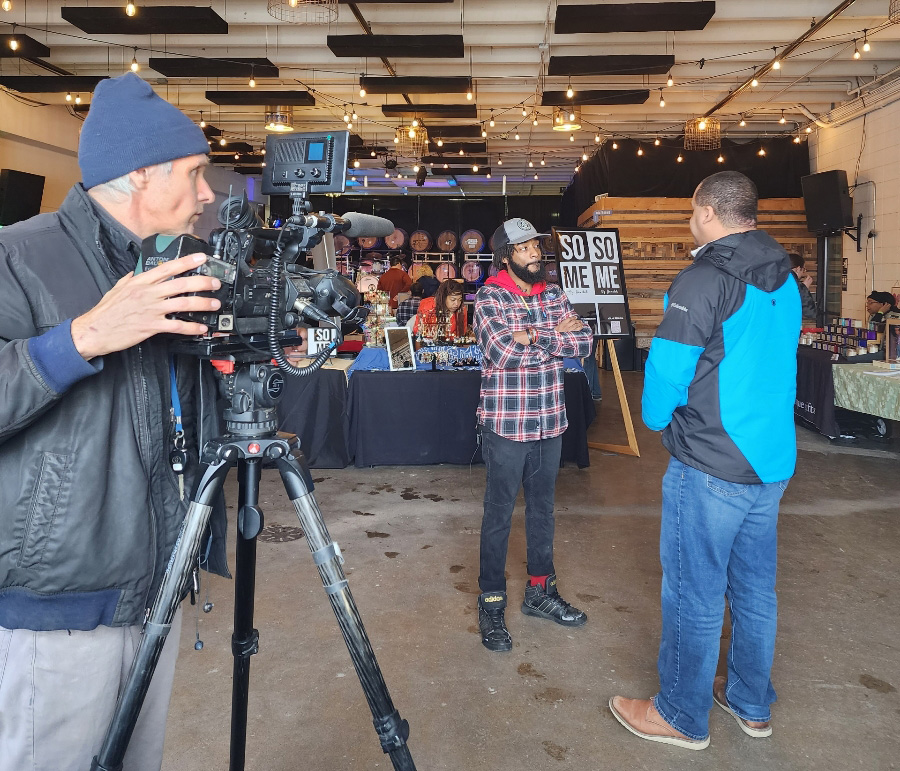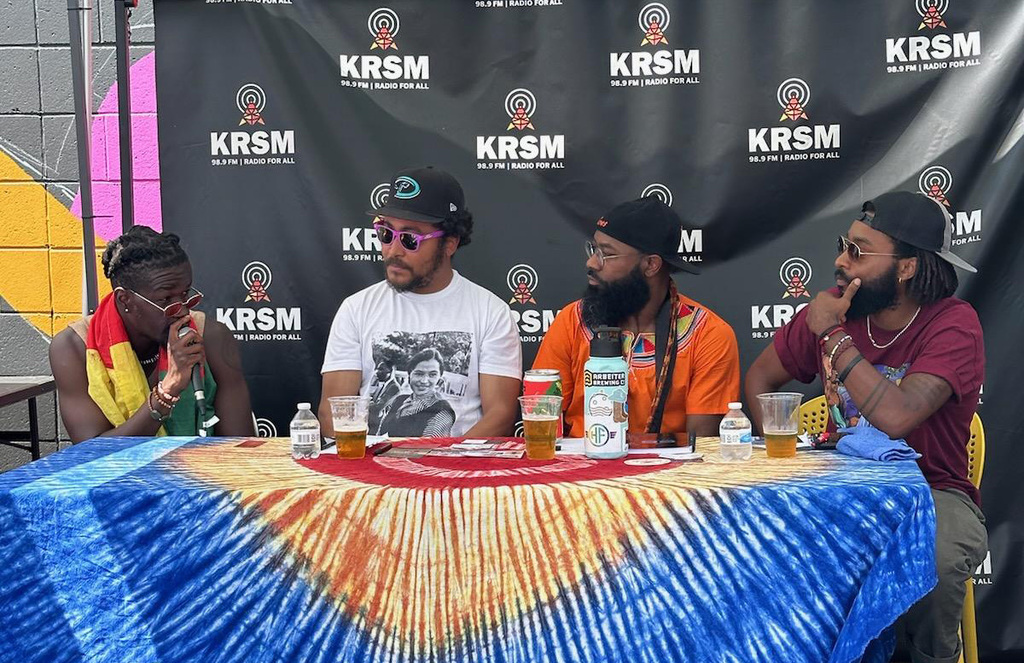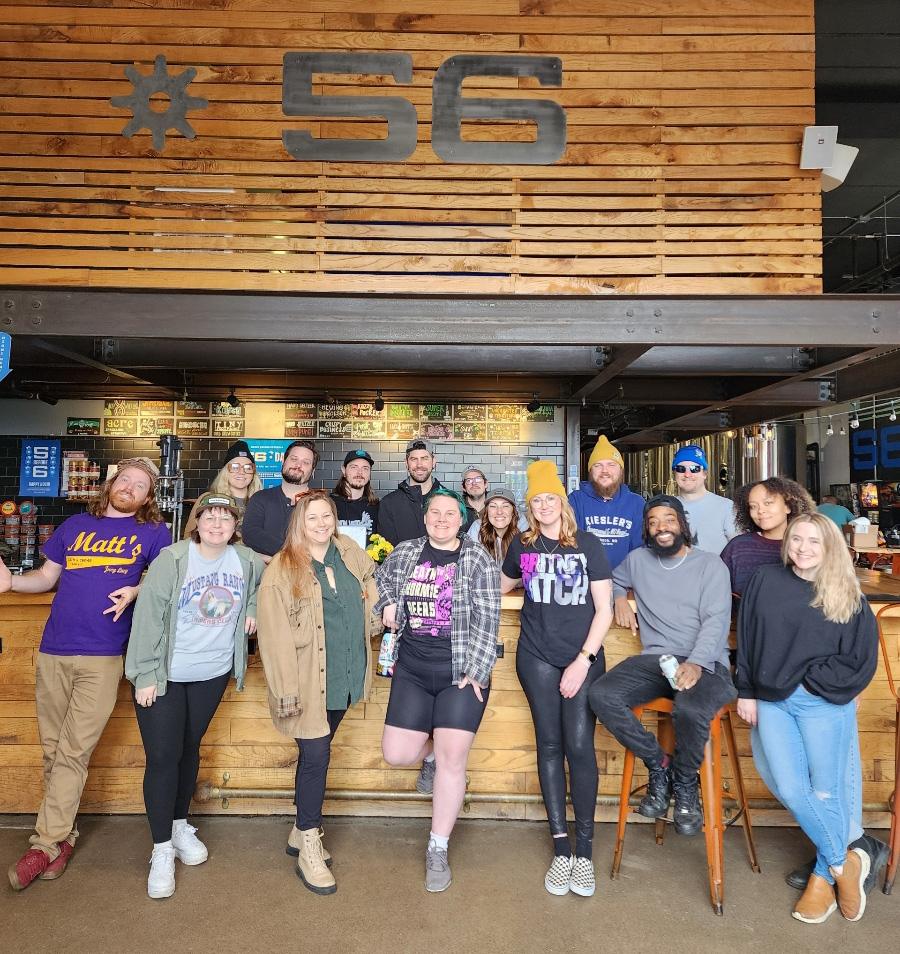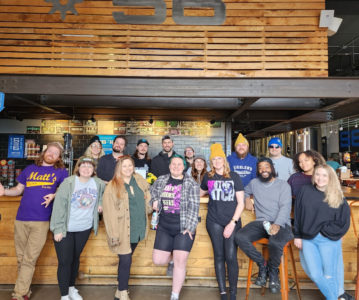The news spread like wildfire across the Twin cities in 2020 when major news outlets like the Minneapolis Star Tribune reported that Kale Johnson, (now former) co-owner of 56 Brewing was accused of tying a knot resembling a noose and waving it at Mahad Muhammad, a (now former) employee, at an event two years prior. Johnson is white; Mauhammad is Black.
After the incident came to light, Johnson explained his behavior in a (now-deleted) social media post, saying it was a sailor and bowline knot, and said he apologized to Muhammad, not meaning for the incident to come off as racist. Blowback on social media came swift and hard. George Floyd was murdered by a police officer in Minneapolis just a month before the story broke, and the focus on the 56 Brewing incident was intensified following a wave of protests all over the country. The stance of the broader brewing community was clear: avoid 56 Brewing. All across social media, people shamed 56 Brewing and made their intentions to boycott the brewery very clear. It is not surprising; when incidents of harassment and discrimination surface, people understandably pay attention and demand change.
What gets less attention is how a brewery moves forward.
Though Johnson resigned as CEO roughly a week after the incident was made public (he and his wife divested from the brewery later), 56 Brewing is still navigating the ramifications of this incident nearly three years on. With social media, public fallout from accusations of racism, harassment and discrimination is often swift and extreme. Users can pile on to a post with a quick share or comment without considering context or complexity. 56 Brewing’s story of moving forward with purpose and success in an unforgiving digital landscape is a sound roadmap after a devastating incident.
Editor’s note: The author of this article reached out to Muhammad for comment, but he, understandably, did not want to talk about the incident anymore. He did say that “this was one of many experiences for me and millions of BIPOC who have to navigate this world daily, dealing with these aggressions.” He also knows people at 56 Brewing whom he cares deeply for, but declined to comment on 56’s current situation.
A Terrible Incident
Danielle Pallas woke up to direct messages on her social media accounts from people she knew and others she didn’t. Screenshots of the initial details of the racist incident at 56 Brewing were being posted to social media and shared widely.
“We woke up to this on the internet: ‘How dare you support them and work there,’” Pallas recalls.
The initial staff action was to write personal letters of resignation stating they did not support the owner and would no longer be working for the business while he was a part of it. Pallas, now 56 Brewing’s go-to person for community engagement, social media, and marketing, said that went on for a couple of weeks. Nearly everybody who kept the business running was no longer a part of it. There was a lot of back and forth with the co-owners not implicated in the incident on what to do and how to move forward.
“It did happen and is our history.”
Danielle Pallas, 56 Brewing
The Minnesota Craft Brewers Guild removed 56 Brewing from the Guild, the first brewery to ever face such a sanction. This move, in hindsight, seemed wrong to Guild leadership, who lacked a formal process for dealing with a situation like this one. It helped push along a code of conduct and a diversity, equity, and inclusion (DEI) committee to better handle similar situations in the future.
“I know the Guild after the fact had realized that their initial reaction to the incident was likely the wrong move,” Minnesota Craft Brewers Guild president Ashley Hauf said. Hauf adds, “56 had been almost immediately removed from the Guild as a member but after some discussions, the board realized that there wasn’t anything in place to sort of handle these things. That’s when discussions about adding a DEI Committee to the Guild started, and the plan to update our code of conduct to help us better handle situations that may arise.”
Pallas said the initial response to the incident didn’t help matters.
“56’s communications didn’t admit or apologize, but was a more roundabout way of apologizing if it was harmful,” she explains. “I think that furthered the damage beyond just the story itself and the facts. We were closed for a bit of time, a week or two. There was nowhere to go — we had to let it run its course.”
56 Brewing staff and the public wanted to see something happen. Johnson left. But 56 Brewing was cautious about reopening or continuing and remained closed from June 30 to July 9.
“We certainly played on the pros and cons of renaming, rebranding, choosing to ultimately stay with the name for two reasons: our main reason is [that] our current primary owner said this, ‘it did happen and is our history,’” Pallas says. “What good does it do to rebrand and change your name and paint over something ugly that’s happened when we have an opportunity to be under the same name and actually do work to improve in the directions that we’ve hurt people? The other reason, industry-wide, was that it is a huge amount of money to rebrand. And if you’ve visited our taproom, we don’t take our name lightly. It’s on every table and corner of cement. It’s all over the place; it would have been a lot more than changing the name. If we were going to put the time and effort into learning and educating ourselves and staying a part of this community that we hurt, it wouldn’t serve the same purpose to change who we are.”
A New Era
DaQuan Richard, known as Quan, is now 56 Brewing’s sales rep. He moved from Duluth, a Minnesota city north of St. Paul and Minneapolis along Lake Superior, to escape the cold and find more diversity. Richard is also Black. He first arrived in the Twin Cities the week following George Floyd’s murder and three weeks before news of Johnon’s misconduct was made public. Richard worked in restaurants, walking out of one to stage a protest, and volunteered to help the community heal.
Then he met Alex Schafer at 56 Brewing around March 2021, the general manager of sales and eventually chief operating officer. They talked about shadowing him there, but the first time he arrived at 56, Schafer had to fill him in on what had happened in the brewery’s past.

“First thing he said,” Richard recalls. “That really rocked my world; I was not expecting to hear that about that place, but it felt good… where people weren’t trying to hide it and have that conversation from the get-to.”
Schafer showed Richard 56 Brewing’s core values and what they intended to implement. Richard saw the desire to do better and that 56 was making an effort, even if they didn’t always understand what it meant to accomplish their goals: to be diverse, equitable, and inclusive in their hiring, how the taproom feels, and in the events they host. It took a week of consideration, but after shadowing, he took the job.
His experience has been good. Richard can talk to whoever he needs to to learn about brewing or sales. There are opportunities to learn more about bottling, distribution, and tastings.
“Coming into now, when it comes to actions, that’s been a big emphasis to make amends or build and grow what we believe in,” Richard said.
Pallas says 56 Brewing has worked hard so that people like Richard feel that change.
56 Brewing staff connected with Root’d Relations, an LGBTIQIA+-, BIPOC-owned DEI consulting group based in Minneapolis at the time and run by two women. Over the course of the first year after the incident, 56 Brewing employees had six or seven four-hour-long mandated training sessions with Root’d Relations.
“We started at the basic core of everyone in the room with a quiz,” Pallas says. “Write down your definition of diversity. Your definition of inclusion and equity. That conversation was a room full of people who were passionate about being all of these things. At the same time, saying our answers, we had so much to learn.”
56 Brewing formed a DEI committee in 2022. Most staff attended their meetings. At first, it focused on different DEI themes for the month. Pallas says the committee’s work originated the R.E.S.P.E.C.T. Makers Market for Black History Month. It was a day of BIPOC makers at the brewery. It has led to other events promoting the work of Black and LGBTQ+ creatives.
The brewery also updated its hiring processes and policies to be more equitable. It’s been a robust but continuous shift and evolution of the brewery culture that seems to be working.
“Coming in now, it’s a space I feel happy to call one where anyone and everyone can come in,” Richard said. “If you’re not cool with the LGBTQ community… We kick people out. The action and the inflection behind it is the main priority here and why I love going out and doing what I do for 56.”
Black Brewers Podcast Collab
Anthony Jennings is one of the founding trio of the Black Brewers Podcast and a craft beverage industry veteran currently plying his trade part-time at Arbeiter Brewing Co., known for being an inclusive brewery and taproom, and Wooden Ship Brewing Co. Jennings is also a part of the Brewing Change Collab, a non-profit on a mission to make a more equitable craft beverage industry in the Twin Cities, and his podcast highlights people of color and those making changes in the industry.

Jennings doesn’t choose to do brewery collaborations with just anyone, let alone a brewery he doesn’t feel adheres to his principles and mission. He didn’t hesitate to collaborate with 56 Brewing for their final collaboration of 2023: Coco De Mer, an imperial porter with vanilla and coconut.
Jennings was intentional about going into the collab and said he received the okay from Muhammad. But the moment to collaborate wasn’t a right until he met Richard and interviewed him on the Black Brewers Podcast.
“We wanted to really talk to him and see how he is growing there and how they’re different,” Jennings recalls. “It was an honest growth into having this collab. And to see his growth at 56 and seeing them without being told or without asking, making efforts – that’s a big, big deal personally and as a podcast. Seeing them reach out and ask questions.”
Minnesota’s Fight for More Equity In Brewing
The Minnesota Craft Brewers Guild had a DEI committee in the past, but in 2023, it upped its commitment to the committee and its role in the guild. Full disclosure: the writer of this article is on the committee.
In the first meeting of the reinvigorated committee, Hauf asked members if Pallas, and by extension, 56 Brewing, should be admitted onto the committee. A table of eclectic people all working in the industry came to one conclusion: if they don’t allow a way back through growth and allow empathy to rule the day, what’s the point of the group? The decision to allow someone from 56 Brewing to sit on the committee as a member with unique experience made perfect sense.
Minnesota Craft Brewers Guild executive director Jess Talley says the Guild is committed to fostering an inclusive industry in the state. The committee is one way to reach that goal, with the Guild providing scholarships, free training, and more.
“We’ve also developed tools to help protect against and address harm,” Talley explains. “Our code of conduct outlines behavior that the Guild does not tolerate at industry events and describes the process for reporting and investigating violations. All Guild members, staff, volunteers, and event attendees must agree to abide by the code of conduct every year and every major event.”
Talley says the guild’s top aim for the code of conduct and violation process is to protect individuals in the industry from harm. The Guild also wants to foster a better industry in the long run. Part of the DEI Committee’s work for the Guild is to help businesses address harm caused and take accountability. From there, they can grow professionally to regain good standing in the Guild if possible. When the Guild expelled 56 Brewing in 2020, it was the first ever expulsion due to a code of conduct violation. And now it’s back and serving on the DEI committee. That should be seen as authentic growth. 56 Brewing and the Guild all made changes to be better and to better handle a similar situation in the future, should one arise.
“They’re providing extremely valuable guidance and improving the Guild’s DEI work,” Talley says. “We have seen how our entire industry benefits when individuals and businesses take steps towards accountability and growth, and it’s important that our process encourages that. Over five years since our board of directors approved our code of conduct, our DEI committee has investigated a few violations, learning more from each experience. We recognize there is always room for improvement and always more to be done.”
Hauf adds to these points, “Our DEI Committee members have started turning the wheels to create resources, events, and training,” Hauf says. “And I really think 2024 is our year to take our efforts to another level. The Guild has updated our bylaws, our code of conduct (COC) and our COC Investigation process. We’ve implemented changes to our events such as not hiring police but instead outside security that understands updated de-escalation tactics, providing safe ways for members and event participants to submit code of conduct violations, and more.”
A Better Present and Future

Pallas drove to Forgotten Star Brewing Co. for a beer on the same day that the first DEI committee meeting took place. Hauf was still there and told her the news: the committee voted unanimously to have her and 56 Brewing on the committee.
“Immediately, not weight, but an invigorating sense of—exhales—these people are meeting to change how our industry addresses problems we’ve been so closely involved with,” Pallas begins. “This table of people is not only okay with giving us a seat at the table, but they want to hear what we have to share. That was really monumental. I called our owner, who is a close friend of mine and told her,” Pallas continues. “And we both cried on the phone a little bit. Not in a bad way, but holy smokes, we can do something with all of this that can make a difference. It was a really ugly time and situation, but it’s not the last time that’s going to happen. And if there are tools and some guidance we can share, we would rather have other people go through this experience and have some sense of support while they’re doing it.”
56 Brewing won’t forget its past. But it’s on a course to ensure it never happens again, and they’ll use what they learned, and continue to learn, to help better Minnesota’s brewing industry.

